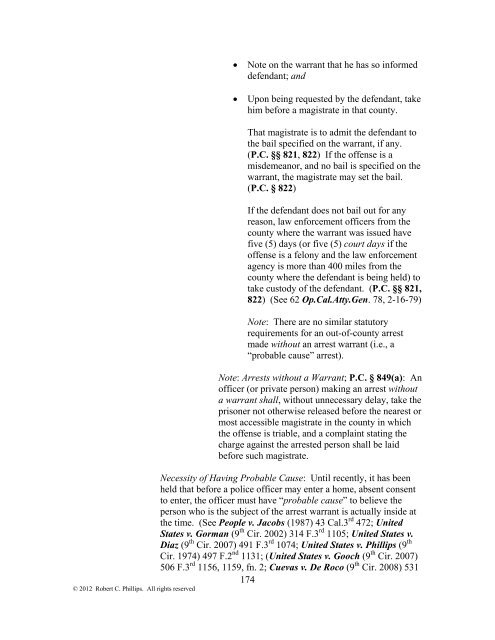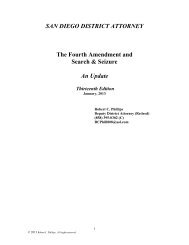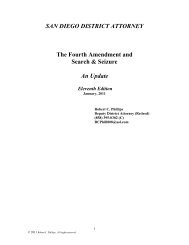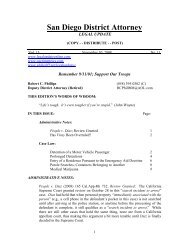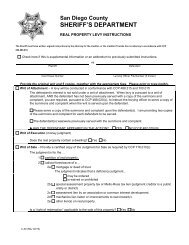- Page 1 and 2:
SAN DIEGO DISTRICT ATTORNEY The Fou
- Page 3 and 4:
Table of Contents Page Chapter Summ
- Page 5 and 6:
New Crimes Committed in Response to
- Page 7 and 8:
The Use of Firearms 26 The Use of H
- Page 9 and 10:
To Identify a Suspect in a Criminal
- Page 11 and 12:
Detentions of Employees in the Work
- Page 13 and 14:
Booking into Jail 152 Take the Subj
- Page 15 and 16:
Other Types of Arrest Warrants: 170
- Page 17 and 18:
Sufficiency of Evidence that the Su
- Page 19 and 20:
P.C. § 848: Arrests by Warrant 214
- Page 21 and 22:
Renters with a Stolen Credit Card 2
- Page 23 and 24:
Exigent Circumstances 262 Non-Stand
- Page 25 and 26:
Unreliable (“Untested”) Informa
- Page 27 and 28:
P.C. § 1524.3: Out-of-State Electr
- Page 29 and 30:
Other Than Violent Felonies 360 Rig
- Page 31 and 32:
Entry by Ruse 382 Standing; An Abse
- Page 33 and 34:
Parental Kidnappings 410 Avoiding C
- Page 35 and 36:
Administrative Inspection of Fire-D
- Page 37 and 38:
Probable Cause from the Defendant
- Page 39 and 40:
Searching for Identification 464 Fi
- Page 41 and 42:
Purpose 488 Identification of Crimi
- Page 43 and 44:
Containers 507 Probable Cause Not N
- Page 45 and 46:
Other Buildings and Places: 542 Hot
- Page 47 and 48:
Detentions Outside 567 Commercial E
- Page 49 and 50:
With Consent of a Third Person havi
- Page 51 and 52:
Who May Conduct a Fourth Waiver Sea
- Page 53 and 54:
Product of a Constitutional Violati
- Page 55 and 56:
SAN DIEGO DISTRICT ATTORNEY The Fou
- Page 57 and 58:
a jury; and (3) deter future illega
- Page 59 and 60:
Constitution and federal statutes.
- Page 61 and 62:
The Constitution of the United Stat
- Page 63 and 64:
Second, we inquire whether the indi
- Page 65 and 66:
“A federal court may grant habeas
- Page 67 and 68:
Chapter 2 Consensual Encounters: Ge
- Page 69 and 70:
easonable person to feel that he wa
- Page 71 and 72:
detention. (United States v. Drayto
- Page 73 and 74:
the officers should have informed p
- Page 75 and 76:
See also People v. Maury (2003) 30
- Page 77 and 78:
Chapter 3 Detentions: General Rule:
- Page 79 and 80:
A person is not actually detained (
- Page 81 and 82:
was asked to step away from the boa
- Page 83 and 84:
vehicle for weapons held not to be
- Page 85 and 86:
Non-Consensual Transportation Excep
- Page 87 and 88:
enforcement officers where none exi
- Page 89 and 90:
However, “the possibility of inno
- Page 91 and 92:
Types of Detentions: Traffic Stops:
- Page 93 and 94:
Vehicle Code § 22107 (Failure to s
- Page 95 and 96:
In a case decided by the United Sta
- Page 97 and 98:
See also Collier v. Montgomery (5 t
- Page 99 and 100:
Weaving within a lane for three qua
- Page 101 and 102:
and not excessive force under the c
- Page 103 and 104:
A missing rear license plate and no
- Page 105 and 106:
The theory of Whren is limited to t
- Page 107 and 108:
opposed to a taxi, bus, or other co
- Page 109 and 110:
Should additional justification be
- Page 111 and 112:
stay inside the car or by ordering
- Page 113 and 114:
(People v. Britton (2001) 91 Cal.Ap
- Page 115 and 116:
A probation officer may lawfully de
- Page 117 and 118:
2011) 632 F.3 rd 1064, 1079-1081; h
- Page 119 and 120:
And see United States v. Mendez (9
- Page 121 and 122:
officer recognized as something an
- Page 123 and 124:
used at the checkpoint, (ii) the ra
- Page 125 and 126:
checkpoint to check for violations
- Page 127 and 128:
that the person may be involved in
- Page 129 and 130:
possible association is investigate
- Page 131 and 132:
detention for that purpose). There
- Page 133 and 134:
and her apparent lies concerning no
- Page 135 and 136:
driving to his wife’s house for t
- Page 137 and 138:
To Establish Probable Cause: (Unite
- Page 139 and 140:
case of a “physical (as opposed t
- Page 141 and 142:
standards applicable to school offi
- Page 143 and 144:
337, 340; “Detention in a patrol
- Page 145 and 146:
Fifth Amendment right against self-
- Page 147 and 148:
Detentions of an Employee in the Wo
- Page 149 and 150:
oad enough to affect a police offic
- Page 151 and 152:
suspicion” to believe a violation
- Page 153 and 154:
Chapter 4 Arrests: Defined: The “
- Page 155 and 156:
person to be . . . seized.’ [Cita
- Page 157 and 158:
involved in the martial arts and li
- Page 159 and 160:
Examples: innocence,” is also irr
- Page 161 and 162:
A minor (14 years old) was seized w
- Page 163 and 164:
the Fourth Amendment’s exclusiona
- Page 165 and 166:
Note: A civil rights action pursuan
- Page 167 and 168:
Factors to consider in determining
- Page 169 and 170:
Fountain Valley (2005) 137 Cal.App.
- Page 171 and 172:
eanbag; Bryan v. MacPherson (9 th C
- Page 173 and 174:
P.C. § 844: “To make an arrest,
- Page 175 and 176:
force used was reasonable under the
- Page 177 and 178: ecent cases: “‘Ordinarily, an o
- Page 179 and 180: Burglary of a Residence was conside
- Page 181 and 182: legally justify the application of
- Page 183 and 184: self-defense in a murder case, migh
- Page 185 and 186: (People v. Ross (2007) 155 Cal.App.
- Page 187 and 188: dangerous felonies listed in the mu
- Page 189 and 190: a duty to warn, where appropriate,
- Page 191 and 192: The question is not whether an obje
- Page 193 and 194: due process right to “familial as
- Page 195 and 196: Legal Authority for Arrests: Arrest
- Page 197 and 198: Arrests by a Private Person: P.C.
- Page 199 and 200: Superior Court (1950) 98 Cal.App.2
- Page 201 and 202: P.C. § 830.8(c): National Park Ran
- Page 203 and 204: 42 U.S.C. § 1983 federal civil rig
- Page 205 and 206: misdemeanor not in the officer’s
- Page 207 and 208: provisions of the Penal Code on fel
- Page 209 and 210: 3. Battery on School Grounds during
- Page 211 and 212: P.C. § 243(f)(10): “Dating Relat
- Page 213 and 214: (1907) 152 Cal. 42, 47.) What is an
- Page 215 and 216: See also the same reasoning being u
- Page 217 and 218: committing a business license infra
- Page 219 and 220: Violation of V.C. § 23109, relatin
- Page 221 and 222: Witness intimidation, per P.C. § 1
- Page 223 and 224: There is reasonable likelihood that
- Page 225 and 226: warrant is the filing of a complain
- Page 227: no violation even though he does no
- Page 231 and 232: The temporal proximity of the Fourt
- Page 233 and 234: arrests has been held to be statuto
- Page 235 and 236: suspect into physical custody. (Fis
- Page 237 and 238: (1965) 63 Cal.2 nd 690; United Stat
- Page 239 and 240: lood/alcohol level might dissipate
- Page 241 and 242: physically inside the door is also
- Page 243 and 244: cause, using a ruse to trick people
- Page 245 and 246: the officers. Accordingly, the cour
- Page 247 and 248: to suppression. Defendant’s arres
- Page 249 and 250: probable cause for another offense.
- Page 251 and 252: enforcement source, and what was no
- Page 253 and 254: Reversed Prior Conviction: A probat
- Page 255 and 256: Minors violating curfew may be stop
- Page 257 and 258: Foreign Nationals; P.C. § 834c(a)(
- Page 259 and 260: However, a number of justices have
- Page 261 and 262: defendants whose Vienna Convention
- Page 263 and 264: This admonishment, under the terms
- Page 265 and 266: Case Law: This information, includi
- Page 267 and 268: The calls are to be at public expen
- Page 269 and 270: P.C. § 849(c): Any record of arres
- Page 271 and 272: Probable Cause: Roughly the same st
- Page 273 and 274: Exceptions: Examples: Cir. 2000) 20
- Page 275 and 276: 697]; Herring v. United States (200
- Page 277 and 278: United States (2009) 555 U.S. 135 [
- Page 279 and 280:
A “knock and notice” violation:
- Page 281 and 282:
collected blood samples, nor is it
- Page 283 and 284:
Asset Forfeiture Proceedings: Evide
- Page 285 and 286:
(People v. Koury (1989) 214 Cal.App
- Page 287 and 288:
People v. Stewart (2003) 113 Cal.Ap
- Page 289 and 290:
Residential Visitors: An overnight
- Page 291 and 292:
The Fourth Amendment rights of home
- Page 293 and 294:
container contained contraband. The
- Page 295 and 296:
easonable expectation of privacy in
- Page 297 and 298:
in his own yard in that his marijua
- Page 299 and 300:
Determining Reasonableness: The rea
- Page 301 and 302:
Note: California Courts’ ability
- Page 303 and 304:
Army or the Air Force as a posse co
- Page 305 and 306:
Chapter 6 Searches With a Search Wa
- Page 307 and 308:
(United States v. Reeves (9 th Cir.
- Page 309 and 310:
“Omissions or misstatements resul
- Page 311 and 312:
urden of proving that the officers
- Page 313 and 314:
search warrant, despite the officer
- Page 315 and 316:
provide any basis for the tip that
- Page 317 and 318:
Such a warrant may also be obtained
- Page 319 and 320:
1993) 985 F.2 nd 946, 950; United S
- Page 321 and 322:
States (1967) 389 U.S. 347, 355, fn
- Page 323 and 324:
The section further requires Califo
- Page 325 and 326:
A warrant that fails to include a l
- Page 327 and 328:
provided in P.C. § 12028.5(b). Thi
- Page 329 and 330:
there is a fair probability that co
- Page 331 and 332:
A signal photograph of a nude minor
- Page 333 and 334:
A chronological narrative and factu
- Page 335 and 336:
officers may mistakenly search anot
- Page 337 and 338:
searched as within the curtilage of
- Page 339 and 340:
See also: United States v. Spilotro
- Page 341 and 342:
Whether the visual depiction sugges
- Page 343 and 344:
See also Guest v. Leis (6 th Cir. 2
- Page 345 and 346:
See “Computer Searches,” under
- Page 347 and 348:
In Smith, an “extraordinarily bro
- Page 349 and 350:
cause to believe that the [given] c
- Page 351 and 352:
information stale.” (People v. Ca
- Page 353 and 354:
See also City of Santa Cruz v. Muni
- Page 355 and 356:
However, law enforcement officers i
- Page 357 and 358:
Sources of Information Establishing
- Page 359 and 360:
a crime, “absent some circumstanc
- Page 361 and 362:
Such a person has a proven track re
- Page 363 and 364:
insufficient. [Citation.] Courts ta
- Page 365 and 366:
“Luttenberger” Motions: It is t
- Page 367 and 368:
Sometimes referred to as a “Skelt
- Page 369 and 370:
child molest and the molester’s a
- Page 371 and 372:
See “Consent,” below. “Inevi
- Page 373 and 374:
property, and the industry involved
- Page 375 and 376:
Mortgage Fraud Records: Note: The a
- Page 377 and 378:
A “pen register” is a device th
- Page 379 and 380:
of a pen register by the issuance o
- Page 381 and 382:
Per Corp. Code § 2105, foreign cor
- Page 383 and 384:
(1972)) Both the California Invasio
- Page 385 and 386:
conduct or operation of the service
- Page 387 and 388:
A judge is prohibited from granting
- Page 389 and 390:
a wiretap application makes it impo
- Page 391 and 392:
communication involving any of the
- Page 393 and 394:
P.C. § 629.51: Definitions: to hea
- Page 395 and 396:
2. Murder, The substance exceeds te
- Page 397 and 398:
(People v. Zepeda (2001) 87 Cal.App
- Page 399 and 400:
is not enough alone to establish ne
- Page 401 and 402:
• Thirty (30) days. The 30-day li
- Page 403 and 404:
any error. Under that framework, th
- Page 405 and 406:
• The number of trials resulting
- Page 407 and 408:
statutes. There is no expectation o
- Page 409 and 410:
efore trial, hearing or proceeding
- Page 411 and 412:
P.C. § 629.74: Disclosure to Other
- Page 413 and 414:
• The officer shall continue to g
- Page 415 and 416:
intercepted in accordance with the
- Page 417 and 418:
Nothing in P.C. § 637 (Wrongful di
- Page 419 and 420:
to use the communications or eviden
- Page 421 and 422:
authorized by Public Law 280 (18 U.
- Page 423 and 424:
Mechanics of Preparation: (People v
- Page 425 and 426:
Out-of-County Service: Search warra
- Page 427 and 428:
It is permissible for a burglary vi
- Page 429 and 430:
Exceptions: Businesses: The rule do
- Page 431 and 432:
Officers were found to have waited
- Page 433 and 434:
officers. (People v. Newell (1969)
- Page 435 and 436:
Upon seeing an altercation taking p
- Page 437 and 438:
Cal.3 rd 263, 276; Payton v. New Yo
- Page 439 and 440:
case, pursuant to P.C. § 844. (In
- Page 441 and 442:
The magistrate’s failure to initi
- Page 443 and 444:
procedures set forth in the America
- Page 445 and 446:
Other courts have held that the con
- Page 447 and 448:
Court noted that the issue was whet
- Page 449 and 450:
586 [165 L.Ed.2 nd 56] (ruling that
- Page 451 and 452:
While a criminal defendant’s due
- Page 453 and 454:
Examples: traverse after full discl
- Page 455 and 456:
(People v. Galland (2008) 45 Cal.4
- Page 457 and 458:
Take the original warrant, with a s
- Page 459 and 460:
The court will review the material
- Page 461 and 462:
Reasonable force may be used to ins
- Page 463 and 464:
It is not supposed to be an issue i
- Page 465 and 466:
The Department of Justice has estab
- Page 467 and 468:
No Search: There is no search when
- Page 469 and 470:
Observing defendant retrieving cont
- Page 471 and 472:
Examples: Exceptions: This, however
- Page 473 and 474:
Examples: Per the California Suprem
- Page 475 and 476:
properly used when necessary to eff
- Page 477 and 478:
Searches of employee backpacks to p
- Page 479 and 480:
Fourth Amendment probable cause req
- Page 481 and 482:
Note that Greene v. Camreta (9 th C
- Page 483 and 484:
usiness under authority of the Gun
- Page 485 and 486:
School Searches: United States Code
- Page 487 and 488:
lawful TSA administrative search ma
- Page 489 and 490:
See also the concurring, minority o
- Page 491 and 492:
only citing the driver for a speedi
- Page 493 and 494:
“custodial arrest.” (See People
- Page 495 and 496:
Contemporaneous in Time and Place:
- Page 497 and 498:
It matters not that the container s
- Page 499 and 500:
opportunity to obtain a search warr
- Page 501 and 502:
(Hammer v. Gross (9 th Cir. 1991) 9
- Page 503 and 504:
Thus, any subjective expectation de
- Page 505 and 506:
School athletics: (Vernonia School
- Page 507 and 508:
articulable suspicion that he might
- Page 509 and 510:
Patting a non-student down for poss
- Page 511 and 512:
controlled substance, by itself, wa
- Page 513 and 514:
(1987) 194 Cal.App.3 rd 975, 982-98
- Page 515 and 516:
etrieval of the keys from his pocke
- Page 517 and 518:
Abandoned Property: deputy testifie
- Page 519 and 520:
(In re Arturo D. (2002) 27 Cal.4 th
- Page 521 and 522:
Absent an arrest, the refusal to pr
- Page 523 and 524:
See Gov’t. Code § 26640; duty of
- Page 525 and 526:
make as a matter of internal police
- Page 527 and 528:
opposed to a non-contact visual) bo
- Page 529 and 530:
Angeles (9 th Cir. 1989) 885 F.2 nd
- Page 531 and 532:
“strip search” or a “visual b
- Page 533 and 534:
Therefore, the resulting evidence w
- Page 535 and 536:
Omnibus Crime Control and Safe Stre
- Page 537 and 538:
conversation between a person in th
- Page 539 and 540:
elated to “legitimate penological
- Page 541 and 542:
inspection, may require “probable
- Page 543 and 544:
P.C. § 295(e): Unless otherwise re
- Page 545 and 546:
Reduction of defendant’s felony c
- Page 547 and 548:
One’s religious beliefs might pro
- Page 549 and 550:
adjudication as a ward of the court
- Page 551 and 552:
Department of Justice DNA Laborator
- Page 553 and 554:
Justice approved collection kit and
- Page 555 and 556:
(a): Sharing or dissemination of po
- Page 557 and 558:
See also United States v. Lujan (9
- Page 559 and 560:
California’s provisions for extra
- Page 561 and 562:
With Probable Cause When the Vehicl
- Page 563 and 564:
If his car is within the “lunging
- Page 565 and 566:
injury to his intended victim, to a
- Page 567 and 568:
and the record contains expert test
- Page 569 and 570:
and secured in a patrol car, should
- Page 571 and 572:
Osife, supra, reaffirming the rule
- Page 573 and 574:
Having probable cause to arrest a p
- Page 575 and 576:
contraband or other seizable items,
- Page 577 and 578:
The same rule applies to a houseboa
- Page 579 and 580:
Inventory Searches: A lawfully impo
- Page 581 and 582:
Unless required by the officer’s
- Page 583 and 584:
Statutory Automobile Inspections: V
- Page 585 and 586:
V.C. § 2805(b): Elements: Provides
- Page 587 and 588:
An auto repair garage may be subjec
- Page 589 and 590:
The driver tells the officer where
- Page 591 and 592:
On the issue of whether the officer
- Page 593 and 594:
vehicle may be for an ulterior purp
- Page 595 and 596:
Chapter 10 Searches of Residences a
- Page 597 and 598:
Also, one who rents a hotel room wi
- Page 599 and 600:
A weekend fishing retreat is an “
- Page 601 and 602:
Steps taken to protect the area fro
- Page 603 and 604:
Lee does not affect the applicabili
- Page 605 and 606:
ceiling. While the door was intende
- Page 607 and 608:
However, assuming the continuing va
- Page 609 and 610:
enter to secure the house pending t
- Page 611 and 612:
the police and go about his busines
- Page 613 and 614:
Using a Ruse to Cause a Suspect to
- Page 615 and 616:
is not illegal. (People v. Rand (19
- Page 617 and 618:
The theory of Gant is not restricte
- Page 619 and 620:
yet been found. (See Los Angeles Co
- Page 621 and 622:
1282, 1284; United States v. Paopao
- Page 623 and 624:
Observation of defendant’s growin
- Page 625 and 626:
Officers responding to a call of a
- Page 627 and 628:
A warrantless entry was upheld to p
- Page 629 and 630:
1083; United States v. Martinez (9
- Page 631 and 632:
“emergency doctrine” is an exce
- Page 633 and 634:
Also see Calabretta v. Floyd (9 th
- Page 635 and 636:
With probable cause to believe a bu
- Page 637 and 638:
ensuing standoff does not dissipate
- Page 639 and 640:
However, noting that five other fed
- Page 641 and 642:
Chapter 11 New Law Enforcement Tech
- Page 643 and 644:
Aerial Surveillance: 0verflights ov
- Page 645 and 646:
the curtilage of the home, where th
- Page 647 and 648:
Videotaping and Photographing: “V
- Page 649 and 650:
leash. The dog was where it had a l
- Page 651 and 652:
Cir. 1993) 990 F.2 nd 1129, 1132-11
- Page 653 and 654:
“Deadly Force as Defined by the M
- Page 655 and 656:
lawful, and properly used in the af
- Page 657 and 658:
Cardboard boxes belonging to a home
- Page 659 and 660:
elevant to the charge of arrest whe
- Page 661 and 662:
the way on a high shelf. (United St
- Page 663 and 664:
allowing for a warrantless search o
- Page 665 and 666:
It is irrelevant that the defendant
- Page 667 and 668:
forced to pay out of their own pock
- Page 669 and 670:
e inferred from their outward appea
- Page 671 and 672:
that it contains more of the same,
- Page 673 and 674:
At an Airport: At least where there
- Page 675 and 676:
difficulty of travel in Alaska with
- Page 677 and 678:
Chapter 14 Border Searches: General
- Page 679 and 680:
The statutory authority for the Coa
- Page 681 and 682:
Cal.App.4 th 791, 794-795; citing U
- Page 683 and 684:
Cutting open luggage, if permanent
- Page 685 and 686:
Extended border searches based upon
- Page 687 and 688:
of persons for immigration, drug in
- Page 689 and 690:
1255, 1264-1265.) was reversed by t
- Page 691 and 692:
Parole: A condition of all paroles,
- Page 693 and 694:
The wavier relates to conduct that
- Page 695 and 696:
Waiver,” is an important variance
- Page 697 and 698:
So long as the conditions imposed a
- Page 699 and 700:
(1986) 41 Cal.3 rd 505, 534-535.) w
- Page 701 and 702:
Federal Rule: The Ninth Circuit Cou
- Page 703 and 704:
the subject has waived any right to
- Page 705 and 706:
Exceptions: condition. The rule is
- Page 707 and 708:
Entering a Residence; Probable Caus
- Page 709 and 710:
was not discovered until after the
- Page 711 and 712:
A search of the female defendant’
- Page 713 and 714:
Knock and Notice: The “knock and
- Page 715 and 716:
Chapter 16 Consent Searches: Rule:
- Page 717 and 718:
command by the officer. . . . The e
- Page 719 and 720:
in that house, did not invalidate d
- Page 721 and 722:
And, an illegal detention (or arres
- Page 723 and 724:
[where] new grounds for suspicion o
- Page 725 and 726:
Despite the above authority, the Ni
- Page 727 and 728:
Consent to search defendant’s tru
- Page 729 and 730:
(United States v. Jenkins, supra, a
- Page 731 and 732:
Consent has to be given freely and
- Page 733 and 734:
(1985) 470 U.S. 298 [84 L.Ed.2 nd 2
- Page 735 and 736:
Examples: However, the search of a
- Page 737 and 738:
The search of an adult child’s be
- Page 739 and 740:
Matlock (1974) 415 U.S. 164, 172 [3
- Page 741 and 742:
When a cotenant, who is absent from


